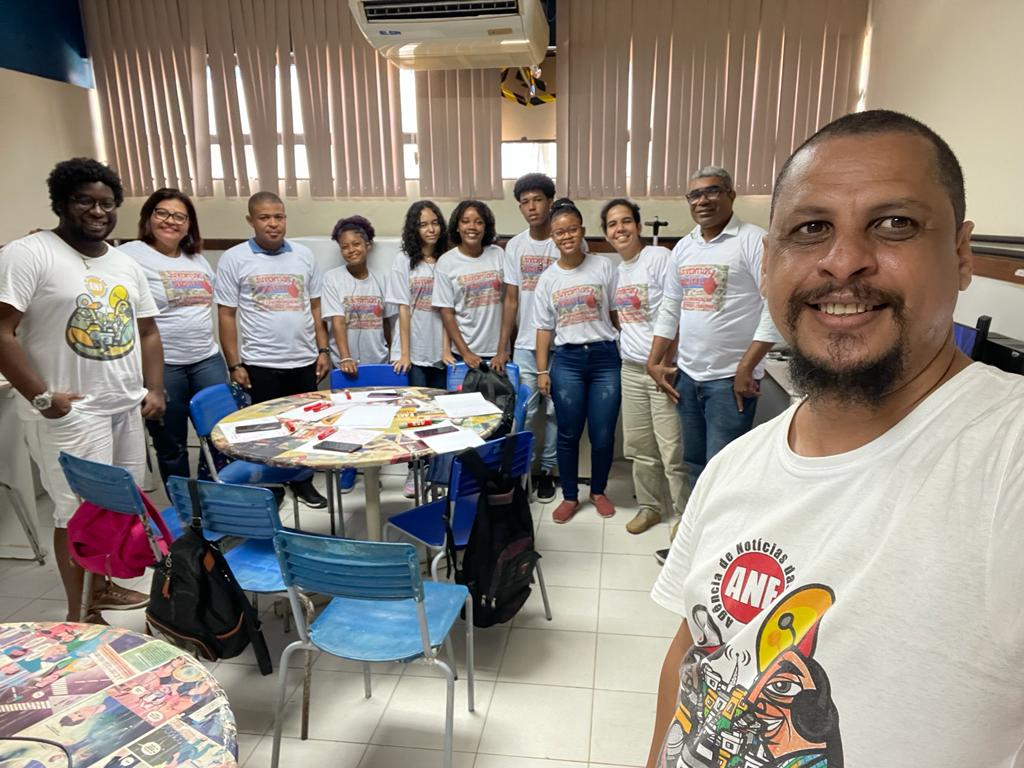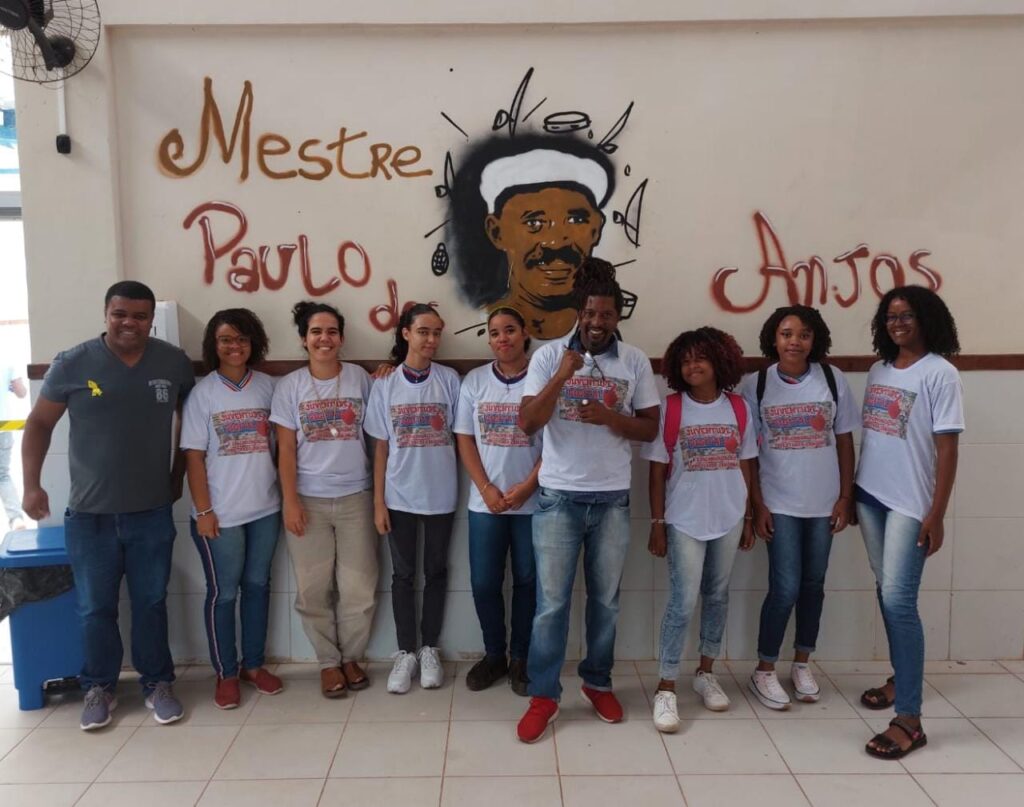
Initiative supported by CESE’s Small Projects Programme promotes communication activities for young people in Bairro da Paz, Salvador, Bahia
To break down social and political barriers to produce diverse communications. This is the commitment undertaken by the Favelas News Agency (Agência de Notícias das Favelas: ANF), a domestic non-governmental organization that promotes practices for the democratization of communication. In Salvador, one highlight is the Digital Youth Project – Edu-communication Connecting Pathways, which is supported by CESE through its Small Projects Programme.
The Digital Youth Project aims to train young people in the appropriate and conscious use of digital media and, in this way, to support digital citizenship. Young men and women are provided with instruments to produce counter narratives, working together towards representative and assertive communication. The idea is to use the communication products created by these young people to help to break down social stereotypes, combatting the criminalization of favelas and stimulating the production of educational and representative content.
According to Paulo de Almeida, ANF Editor and Social Action Coordinator, the project involved training in community communication for 30 young people from Bairro da Paz, in Salvador’s periphery, where the ANF has its offices. Activities were run in small groups and collectively, focusing on combatting fake news, promoting representation, diversity and counter narratives, and valuing Human Rights. The activities were run in partnership with the Mestre Paulo dos Anjos College.
Training was provided through three workshops: digital reading, smartphone video production and another one called “The Periphery is Central”. A seminar entitled “Media Education and Combatting Fake News” was also held, to discuss not only how to combat the dissemination of fake news, but also the importance of understanding how the media environment works and how to use it appropriately, to ensure the responsible and ethnical use of digital media.

According to the editor, one important feature of the current communication context is how “the advent of new technological resources, such as the internet, mean that every citizen can be a communicator, moving away from the role of mere receiver and taking on the function of broadcaster, which is part of the democratization of communication”. The expansion of production channels and the rapid spread of news has another side: the risk of creating the right conditions for the dissemination of fake news, which, in Paulo’s opinion, has had a very clear impact on the most vulnerable sectors of society.
Mindful of this scenario and of the urgent need for good practices, the ANF has launched a book “New Directions for Community Communication in Brazil.” Nine communicators from all of Brazil’s regions contributed to the publication, providing regional perspectives about how community communication has combatted fake news.
Favelas News Agency (Agência de Notícias das Favelas: ANF) – the Digital Youth Project – Edu-communication Connecting Pathways is one of the ANF’s ongoing activities to create counter narratives and help break down stereotypes. One of the challenges is to identify partners committed to this cause and to fundraise to maintain the team and continue activities. “Because it is a social institution, based in the third sector, there is a constant and unequal struggle against the communication companies,” he added.

Paulo went on to say that “for an agency that works on the margins of society and focuses on community communication, one of our main challenges is bursting the social, political and bureaucratic bubbles that hinder production in the favelas and the promotion of visibility for these products/communicators.”
Considered a symbol of resistance within the concept of the urban quilombo, Bairro da Paz is a lively cultural and artistic hub, that has been recognized as a large-scale receiver, broadcaster, proposer and mobilizer of activities since the 1980s, when the first informal settlements were built. The ANF, which works at international level and has its headquarters in Rio de Janeiro, based its North and Northeast offices there. The organization emerged from the need for favela residents to have a media arena in which they could tell the real stories of the peripheries, providing opportunities so that every resident/citizen can be the spokesperson of their own context.
Created in 2001, the institution works in content and news production by/with/for favela residents, through a print newspaper, social networks and a news outlet. One of its main activities is training communicators through extension courses in community communication, university entrance exam courses, workshops and cultural events. Its target audience is located in the peripheries and made up of adolescents, young people and adults from a range of genders, beliefs and races.
National Day for the Fight for the Democratization of Communication – On the one hand, these new technologies have driven the rapid spread of opinion formers, on the other, old practices remain, even in digital arenas – particularly the dissemination of gossip and the manipulation of shared content. Such practices include media hegemony, concentrated in the hands of a few political and economic groups, the lack of plurality and diversity in the design of mass communication products and constant disputed narratives. In a brief overview, this is the scenario in which Brazil’s National Day for the Fight for the Democratization of Communication came about, a day that is celebrated on 17 October and which, in 2022, is taking place in the middle of the election period, with ongoing clashes, particularly on the national stage.
The date was inaugurated in 2003 and is related to the Day of Democracy in the Media, which is celebrated in several countries as an opportunity to question the concentration of the media within hegemonic groups that function as oligopolies (consisting of private owners of TV and radio broadcasters, pay TV, streaming services, news outlets, print magazines and newspapers). The date is a marker for the democratization of the production of and access to communication, based on the implementation of Brazil’s 1988 Constitution which advocates for and would guarantee greater plurality and diversity, as well as freedom of expression and the necessary conditions for freedom of speech for all members of society.
For Paulo, “the current scenario is demonstrably dangerous, both for the broadcasters and for the professionals who work directly in news production. Threats to democracy also affect attempts and initiatives to democratize communication.” In his opinion, despite the unfavourable political context and the risks to democracy, which could jeopardize their work, there is a need to carry on debating this topic. “It is necessary and it is urgent to maintain our focus on democratizing communication and information, supporting the decentralization of training activities for content production in the peripheries of Brazil,” he added.
According to data collated by Brazil’s National Federation of Journalists (Federação Nacional dos Jornalistas: FENAJ), the country is experiencing an explosion of cases of violence against journalists and the press.

